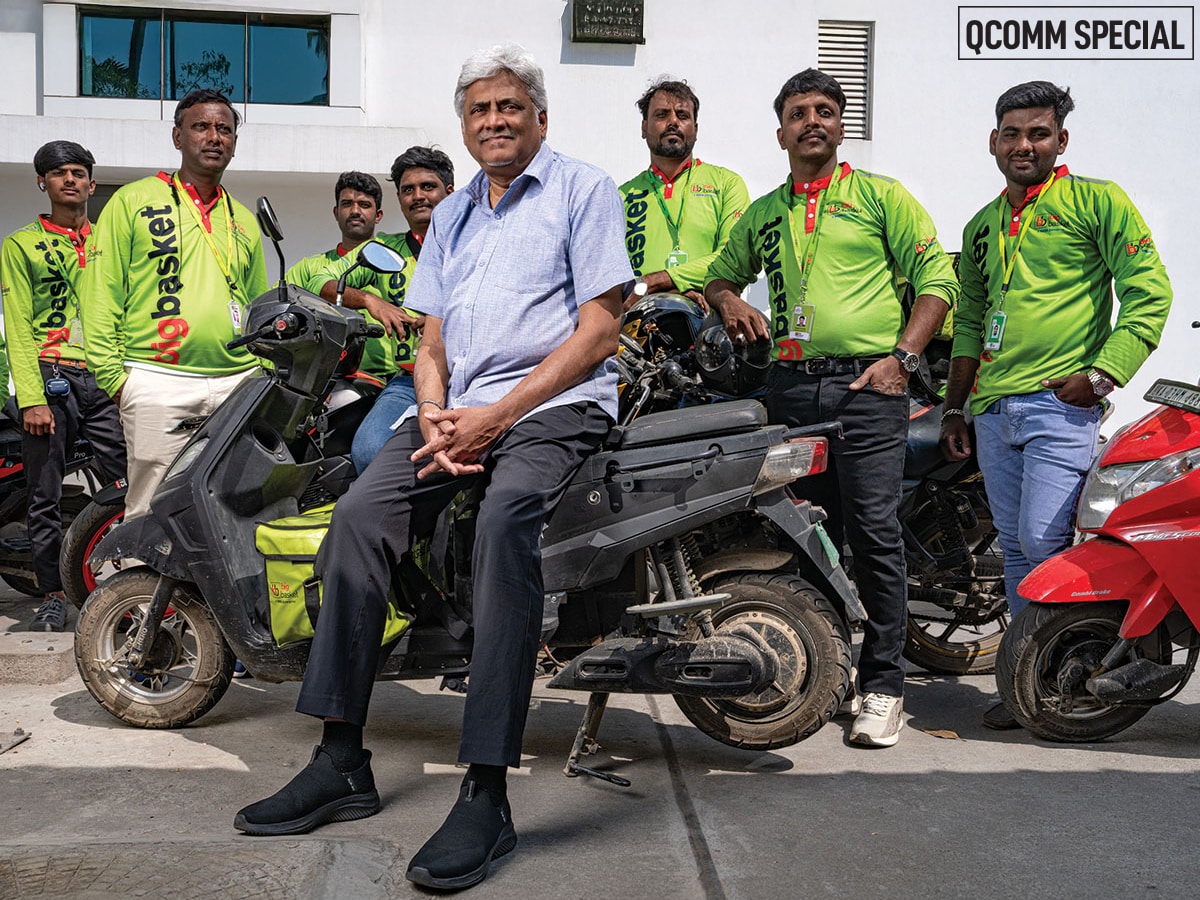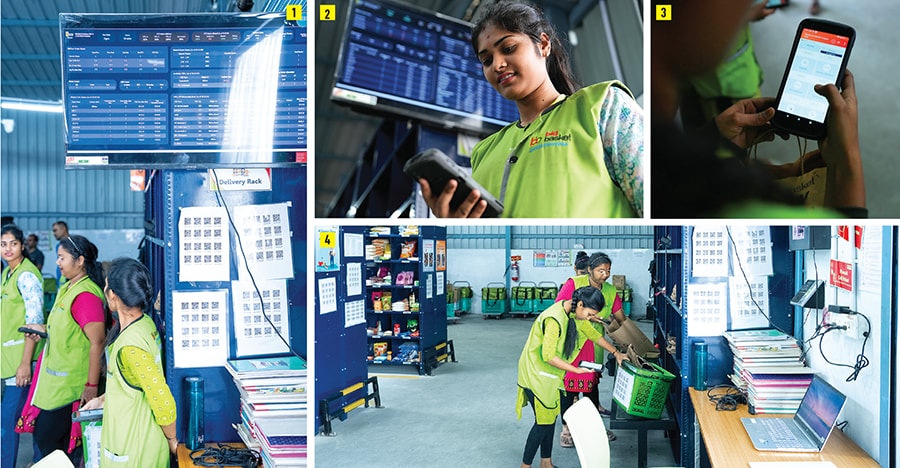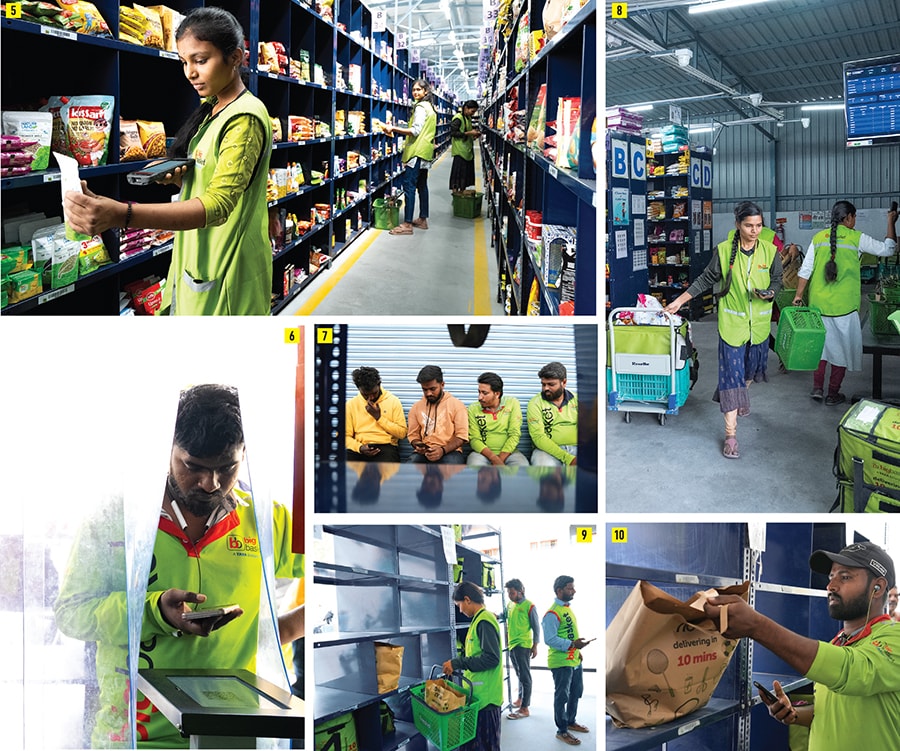 Hari Menon, co-founder and CEO of BigBasket
Hari Menon, co-founder and CEO of BigBasket
Image: Selvaprakash Lakshmanan for Forbes India
Hari Menon, co-founder and CEO of BigBasket, has had a capricious relationship with quick commerce (QComm). He tested the waters with BBNow in 2023. A year later, the Tata Digital-owned company made a complete transition from being India’s biggest online grocery delivery platform to a full-scale quick commerce brand that now gets 50 percent of its business from non-grocery items. Interestingly, as he goes all out to make the company profitable, Menon remains less than elated by QComm’s money-making potential. Edited excerpts from an interview:
Q. You started late. Can you make up for the lost time?
We are playing catch-up. There was a delay, we waited for a year… and that’s why the catch-up. It was a tough transition, but we did this successfully.
Q. What gives you confidence?
We will definitely catch up. I don’t have any doubt. We were already masters of dark stores before the advent of quick commerce. We are not following anything or anybody. Earlier, our stores were 2,000 to 2,500 sq ft. Now, we are rolling out 4,000 to 5,000 sq ft stores, replacing smaller ones. We will try and bring more Tata brands into the fold. This is what will differentiate us.
Q. Is speed no longer a differentiator?
Everybody is delivering in 10 minutes.
Q. Is it possible to bring it down further?
Put dark stores into customers’ houses… ghar mein rakhna padega… then delivery time will fall to two to three minutes [laughs]. Anything less than six to seven minutes is impossible.
Q. What is your strategy of setting up stores?
We are playing [the game] carefully. I am not opening 1,500 stores. I am doing 700 to 800. It makes more sense because it will take you to profitability faster. I don’t think it’s a game where you can just keep throwing money and keep surviving and sustaining. Eventually, you will get questioned.
FROM DARK STORES TO HOMES IN 10-MINUTES
Wonder how the order you placed gets delivered in no time? We explain the back-end operations inside the dark stores before the order is out for delivery
 1. Order appears on screen, ready for processing, 2. Assigned employee receives the order details, 3. Details are displayed on their hand-held device, 4. Employee scans the basket to link it with the order
1. Order appears on screen, ready for processing, 2. Assigned employee receives the order details, 3. Details are displayed on their hand-held device, 4. Employee scans the basket to link it with the order
Q. How important is advertising?
People have options. They will switch. It’s not an easy game to win by doing such things to grab market share. All of us are not happy with the way some of the players are playing… I don’t want to take names. This business has to be built rationally.
Q. How crucial is funding?
The markets don’t remain bullish forever. If you start opening 3,000 to 4,000 stores, worrying signs will emerge. Each store needs a certain density to become profitable. If you don’t get this, the store starts to bleed, and you can afford to bleed till the money lasts.
Also read: Zomato has rebranded to Eternal but it faces old challenges, questions
Q. How about valuations?
High valuation makes you less and less affordable. One needs to manage valuations carefully. In the greed for higher valuations, one ends up making oneself less saleable.
Q. What is it like to be housed in the Tata Group?
They (the Tatas) will never let you burn cash.
Q. What are the pros and cons of being listed?
Both kinds of players have advantages, but the listed ones bring in a lot of discipline. If you do the right things, which Albinder [of Blinkit] is doing, you can continue to grow and not feel chained at all. Markets support you when you do well. And if you don’t do well, it is your own doing and not because markets are beating you up.
 5. Hand-held device guides employee to the location where the goods are stacked. Employee scans the products and put them in a basket 6. Delivery partner scans and signs in 7. Delivery partners wait for orders 8. Once the order is complete, it is placed on the designated rack, and a scan marks it ‘ready’ for pickup 9. Delivery partner gets notification with the rack location for order collection 10. He scans the order, and heads out for delivery
5. Hand-held device guides employee to the location where the goods are stacked. Employee scans the products and put them in a basket 6. Delivery partner scans and signs in 7. Delivery partners wait for orders 8. Once the order is complete, it is placed on the designated rack, and a scan marks it ‘ready’ for pickup 9. Delivery partner gets notification with the rack location for order collection 10. He scans the order, and heads out for delivery
Q. What about first-mover advantage?
In a sense, it is FOMO (fear of missing out), but you can’t do much. When customers move to a model in droves, one needs to be there to cater to the users. So, the business model that emerges is: Let me be there and then figure out how to make money. You just can’t miss the bus.
Q. You have said you were in a state of denial about QComm.
I have said it so many times, but I think “state of denial” was the wrong word. For a year, we tried to understand the model.
Q. So, what did you understand?
In this game, profitability is tough. It is tough to make money but impossible to make too much money. BigBasket was late in taking the plunge because it was figuring out the business model from a unit economics perspective. That question is still open.
Q. How does the math work?
The average order value (AOV), which is a significant part of unit economics, is low. During the peak of BigBasket days, the AOV was between ₹1,400 and ₹1,500. And that’s where you make money, and that is why we were profitable. In the quick commerce avatar, AOV plunged to ₹500 to ₹600. Our blended AOV today is ₹850. And we are the highest in the industry because it’s blended. Blended AOV is a mix of quick commerce and the old slotted or scheduled deliveries. Though BigBasket has made a complete transition, there are users who still prefer slotted deliveries. For a lot of customers, there is no urgency to get deliveries in 10 minutes. But they use quick commerce for their top-ups as they don’t have to go to the kirana store anymore.
Q. So, what is the way ahead for you?
Quick commerce is here to stay. There is a permanent change in human behaviour, and companies have to respond to meet the demand and needs of the young and old consumers. We will catch up, we will keep fine-tuning the model, and we will make money. Let’s see how it pans out.
(This story appears in the 21 March, 2025 issue
of Forbes India. To visit our Archives, click here.)
